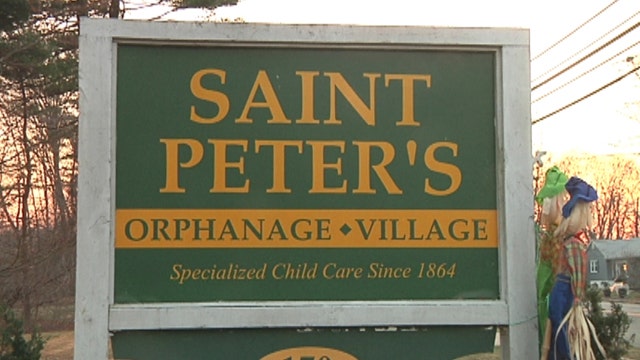Orphanage offers last chance for lost boys
New Jersey residence has become home of last resort to boys between the ages of 12 and 17
St. Peter’s Orphanage, one of the few orphanages remaining in the U.S., is where these boys have landed after they had nowhere else to go.
And for so many of them, it’s the only home they’ll ever want to remember.
“[It] is a home for kids who for a variety of reasons are not able to live with their parents,” says Kelly McNamara, St. Peter’s Orphanage’s executive director. “Some of them, their parents are deceased. Some of them, their parents are incarcerated. Some of them have some substance abuse issues.
“They are certainly kids who have been taken by the State of New Jersey because of abuse and neglect, and those are most of the reason why they’re here.”
Many of the boys at St. Peter’s have behavioral problems like depression, severe anxiety, ADHD, learning disorders, substance abuse and traumatic brain injury from physical abuse.
“Children who have been abused and neglected, they often come with a variety of mental health diagnoses and behaviors that are specific to that situation that they lived in,” McNamara says. “There are other kids who organically have mental health illness, and for us it’s very mild.”
He said children with “significant psychiatric illnesses” are not placed in the orphanage, because it’s the wrong place for them.
“We’re a home,” she said. “We have mild depressive kids. We have kids with mild anxiety. There also are kids with ADHD.”
Most of the boys have had more than one failed adoption, usually due to the adoptive parents’ inability to cope with their emotional issues. When that happens, the orphanage becomes the only safe haven they have.
“The boys who have had what we call failed adoptions, generally it’s because in the adoption process there hasn’t been enough information about the boy and his behaviors, and what his needs are …” McNamara said.
“Or it could be that the adoptive parents didn’t quite understand what they were getting themselves into. Oftentimes these adoptive families really love these children, but when they get them in the home it’s just too much.”
Nevin Perkins, 18, lived at St. Peter’s Orphanage throughout his teens. His father had died, and his mother, a drug addict who already had six children (Nevin would make her seventh), was in no condition to care for him. Now in his first year of college, he says the orphanage saved him from a life behind bars.
“If I continued living in the environment, the path I was going down, it would have led me to jail,” Perkins says. “So me being able to be in a different environment, I was able to flourish because I don’t believe it was me as a person. I was just following the environment I was in, so I was blessed to be moved into a different environment. I was able to succeed.
“I would assume that almost any resident that had a positive experience here would still consider it home,” Perkins said, “because St. Peter’s creates the home environment for you. I’m pretty sure I would have a bed here if I wanted to stay tonight.”
Creating a home-like atmosphere is crucial for the boys’ well-being, says Program Administrator Melody Johansson.
“I believe that we give the boys a sense of home by the hellos, the goodbyes, the goodnights, the good mornings, the how was your school day, the hugs when they need a hug,” she said.
“… [T]hey know we’re all here and they can come to us at any time. All of our office doors are always open.”
Many of the boys come back to St. Peter’s even after they’ve moved on. It’s the only place they called home.
“I had so many kids come back with their family, with their kids, and bring them in with pride and say, ‘This is where I grew up,’” said Program Coordinator Jose Baez. “And they want to give them a tour and show them this is home.”
St. Peter’s is primarily funded by the State of New Jersey, but it depends on the generosity of donors.
“… [O]ur website has a list of things [people] can donate, our contact information and a PayPal tab,” McNamara said. “So if people have decided it’s easier to give money, money will help us in very many ways. And contacting us and asking us what do you need today, what can I buy in the next couple of weeks…
“We have a very big list on the website. What can we do? What can we buy? How can we help? That’s probably the best way if people want to go out and buy something for us.”
For the boys, the donations offer an opportunity to thrive.
“I feel like the donations we get as an orphanage allow us to give the boys the care they deserve, because they haven’t gotten what they needed in the past,” McNamara said. “And it’s only through donations that we’re able to give them those memories that will really last, the care that really makes a difference in their lives.”









































